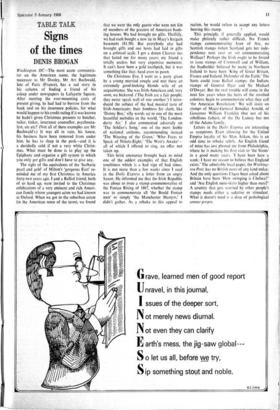Signs of the times
TABLE TALK DENIS BROGAN
Washington DC—The most acute commenta- tor on the American . scene, the legitimate successor to Mr Dooley, Mr Art Buchwald, late of Paris (France), has a sad story in his column of finding a friend of his asleep under newspapers in Lafayette Square. After meeting the ever-mounting costs of present giving, he had had to borrow from the bank and on his insurance policies, for what would happen to his credit rating if itmas known he hadn't given Christmas presents to butcher, tailor, tinker, insurance counsellor, psychoana- lyst, etc etc? (Not all of these examples are Mr Buchwald's.) It was all in vain, his house, his business have been removed from under him, he has to sleep in the park—and it is a decidedly cold if not a very white Christ- mas. What must be done is to play up the Epiphany and• organise a gift system in which you only get gifts and don't have to give any.
The sight of the equivalents of the -`barbaric pearl and gold' of Milton's 'gorgeous East' re- minded me of my first Christmas in• America forty-two years ago. I-and a Balliol friend, both of us, hard..up; were invited to the Christmas celebrations of a very eminent and rich Ameri- can family whose youngest scion we had known at Oxford. When we got to the suburban estate (in the American sense of the term), we found
that we were the only guests who were not kin of members of the greatest of American bank- ing houses. We had brought no gifts. Thriftily, we had each bought a new tie in Macy's bargain basement ($1.50). But everybody else had brought gifts and our hosts had laid in gifts on a colossal scale. I got a dozen Charvet ties that lasted me for many years; my friend a totally useless but very expensive memento. It can't have been a gold toothpick, but it was something like that; hard even to pawn.
On Christmas Eve, I went to a party given by a young married couple and met there an extremely good-looking blonde wife of an acquaintance. She was Irish-American and, very soon, we bickered. (The Irish are a fair people; they never speak well of one another.') I intro- duced the subject of the bad musical taste of Irish-Americans; their fondness for slush, like 'Danny- Boy,' silly words set to one of the most beautiful melodies in the world, The London- derry Air.' I also commented adversely on 'The Soldier's Song,' one of the most feeble of national anthems, recommending instead 'The Wearing of the Green,' Who Fears to Speak of Ninety-Eight,' The West's Awake'— all of which I 'offered to sing, an offer not taken up.
This brisk encounter brought back to mind one of the oddest examples of that English touchiness which is a bad sign of bad times. It is not more than a few weeks since I read in the Daily Express a letter from an angry Saxon. He informed me that the Irish Republic was about to issue a stamp commemorative of the Fenian Rising of 1867, whether the stamp was to commemorate all 'the Bould -Fenian men' or 'simply 'the Manchester Martyrs,' I didn't gather. As a rebuke to this appeal to racism, he would refuse to accept any letters bearing this stamp.
This principle, if generally applied, would make philately rather difficult. No French stamps commemorating Joan of Arc, no Scottish stamps (when Scotland gets her inde- pendence next year or so) commemorating Wallace? Perhaps the Irish ought to be forced to issue stamps of Cromwell and of William, the Stadholder believed by many in Northern Ireland to have been 'King of Great Britain, France and Ireland, Defender of the Faith.' The Scots could issue Balliol stamps; the Indians stamps of General Dyer and Sir Michael O'Dwyer. But the real trouble will come in the next few years when the heirs of the revolted colonists begin to commemorate what they call 'the American Revolution.' We will insist on stamps of Major-General Benedict Arnold, of Governor William Franklin (but not of his rebellious father), of the De Lancey but' not of the Adams family.
Letters in the Daily Express are interesting as symptoms. Even allowing for the United Empire loyalty of Sir Max Aitken, this is an odd time to rebuke rebels. An English friend of mine has just phoned me from Philadelphia. where he is making his first visit to 'the States' in a good many years. 'I have been here a week; I have no reason to believe that England exists.' The admirable local paper, the Washing- ton Post, has no British news of any kind today. And the only questions I have been asked about Britain have been 'How swinging is Chelsea?' and Are English mini-skirts higher than ours?'-. A country that gets worried by other people's stamps needs either a sedative or stimulant. What it doesn't need is a dose of pathological amour pro pre.


































 Previous page
Previous page